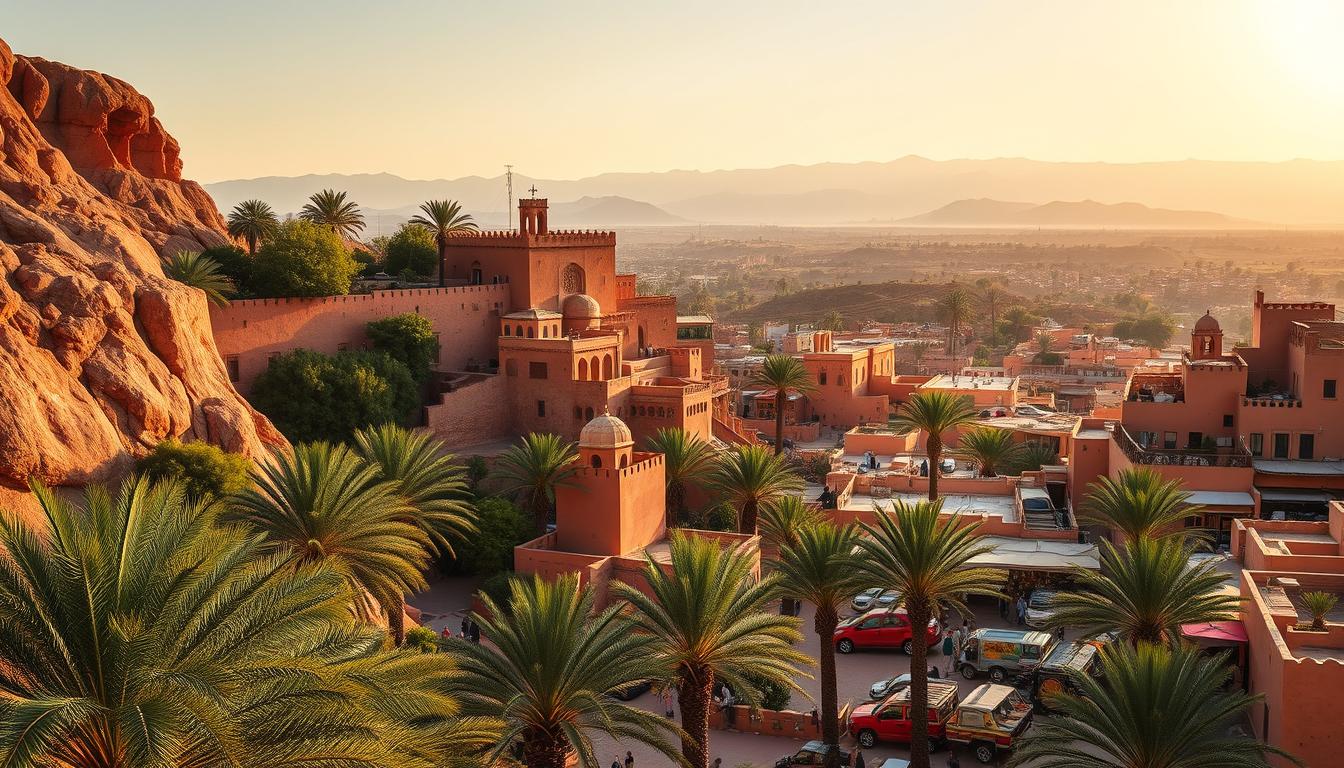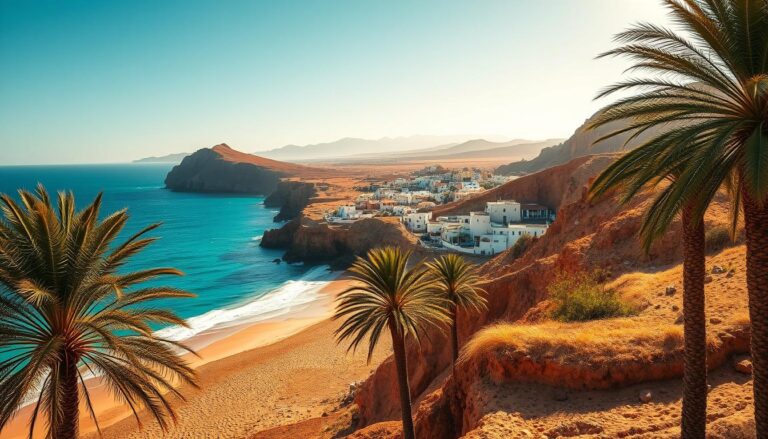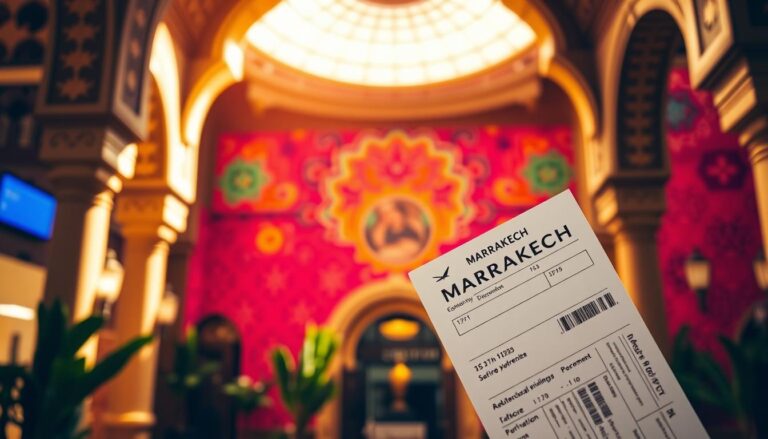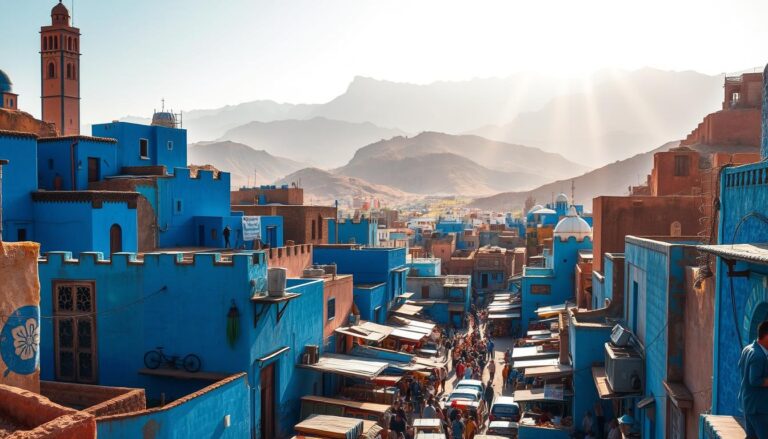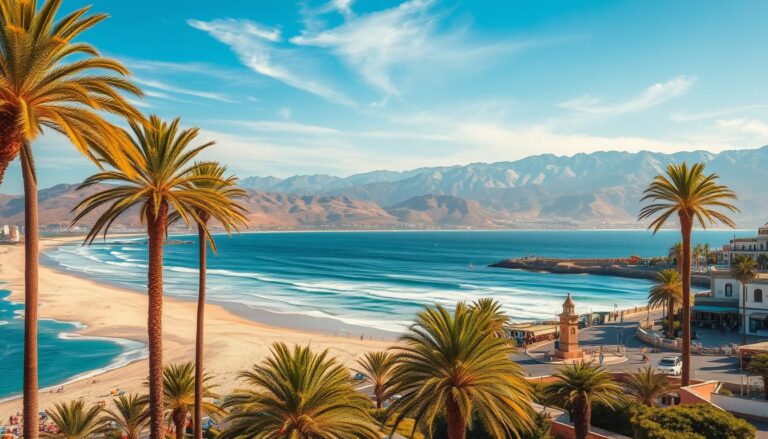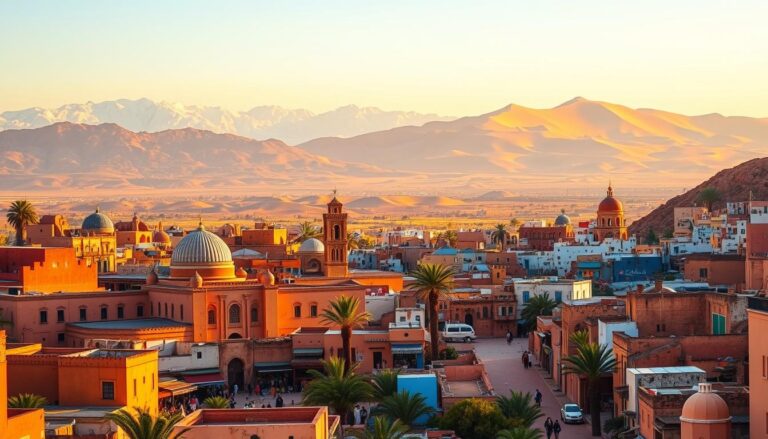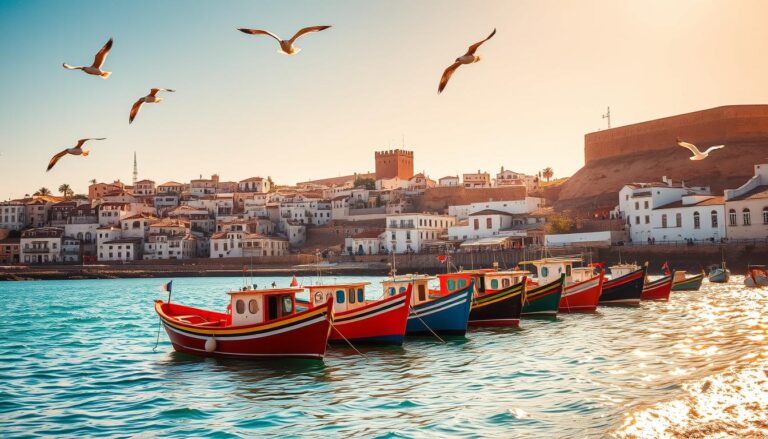10 Best Places to Visit in Morocco in 2025
Table of Contents
Best Places to Visit in Morocco
Did you know Morocco contains nine UNESCO World Heritage Sites within a territory smaller than Spain? This North African jewel offers travellers a unique paradox – ancient medinas unchanged for centuries sit just hours from sleek high-speed trains whisking you between vibrant cities.
You’ll find a country where ochre-coloured kasbahs blend seamlessly with contemporary art galleries. Modern transport upgrades mean you can breakfast in Marrakech’s bustling souks, lunch in Casablanca’s art deco quarter, and dine under Saharan stars – all in one day. The government’s £3.2bn rail expansion makes navigating this diverse landscape surprisingly straightforward.
From the cobalt-blue alleyways of Chefchaouen to the Atlantic surf breaks near Taghazout, Morocco serves up astonishing variety. Snow-dusted Atlas Mountain trails lie mere hours from sun-baked desert ergs, while Mediterranean fishing villages contrast with imperial cities boasting 12th-century architecture.
What truly sets this destination apart? Its accessibility. With multiple daily flights from UK airports taking under three hours, you could be sipping mint tea in a Fes riad by lunchtime tomorrow. Recent tourism investments mean you’ll discover five-star comforts alongside authentic cultural encounters.
Key Takeaways
- Marvel at the seamless blend of ancient traditions and modern infrastructure
- Travel effortlessly between locations using upgraded rail and flight networks
- Experience four distinct landscapes within a single day’s journey
- Enjoy easy access from Europe with multiple UK flight connections
- Discover nine UNESCO sites showcasing centuries of cultural heritage
- Tailor your trip from luxury stays to adventurous backpacking routes
A Glimpse of Morocco’s Timeless Appeal
Step into a world where leather tanners use medieval techniques just streets away from high-speed rail stations. This captivating duality defines Morocco’s charm – a place where heritage isn’t just preserved, but actively woven into daily life.
Vibrant Culture and Historical Treasures
You’ll feel history’s pulse in Fes’ 9th-century university or Meknes’ monumental gates. “Our crafts carry ancestors’ whispers,” shares a Marrakech ceramicist, illustrating living traditions. Wander through Chefchaouen’s blue-washed lanes or Volubilis’ Roman ruins – each corner reveals layers of cultural legacy.
Contemporary galleries in Rabat contrast beautifully with ancient medinas. You might sip mint tea in a 17th-century riad courtyard before exploring innovative design museums. This interplay creates unique moments where time feels beautifully elastic.
Modern Transport and Accessibility
Morocco’s upgraded infrastructure lets you chase sunrise over Erg Chebbi dunes and sunset in Casablanca’s art deco district. The Al Boraq train whisks you from Tangier to Casablanca in 2 hours, while domestic flights connect distant cities effortlessly.
Luxury coaches with Wi-Fi now reach Atlas Mountain villages, blending comfort with adventure. You’ll appreciate how smooth transfers between historic sites and urban hubs let you craft diverse itineraries without logistical headaches.
Experience the Magic of Marrakesh
Marrakesh greets you with a symphony of colours, scents, and sounds that linger long after you leave. This iconic city thrums with energy, from the rose-tinted walls of its historic quarters to the citrus-scented breezes wafting through hidden courtyards.
Colourful Medinas and Bustling Djemaa el-Fna
Lose yourself in the maze-like medina, where lantern-lit alleys reveal treasures like handwoven carpets and gleaming copperware. By dusk, follow the drumbeats to Djemaa el-Fna – a UNESCO-listed square transforming into an open-air theatre of snake charmers and storytellers.
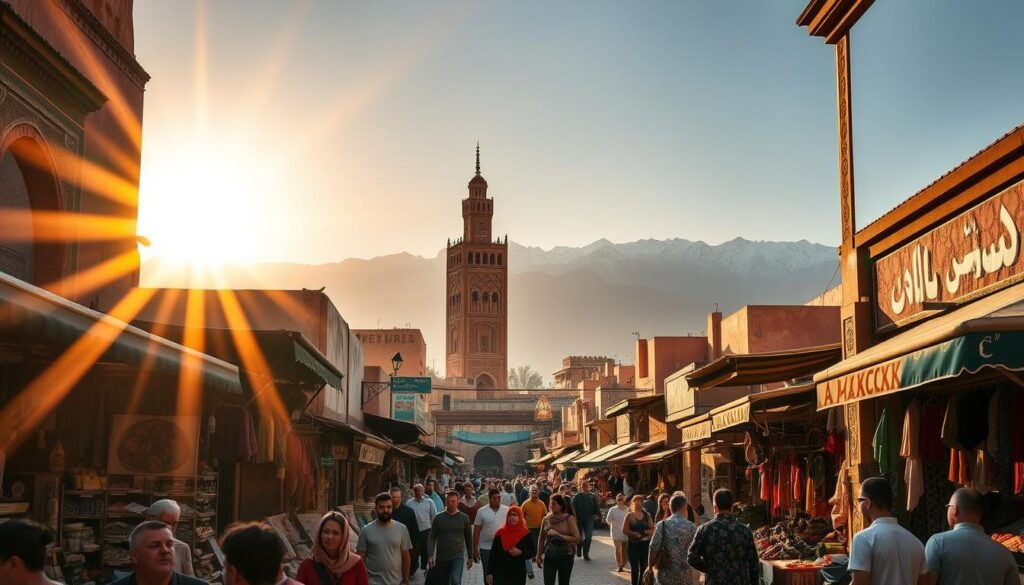
Street food stalls here serve sizzling lamb brochettes and steaming tagines late into the night. Don’t miss the 12th-century Koutoubia Mosque’s silhouette against twilight skies – it’s the perfect backdrop for your first experience of Marrakesh’s nocturnal charm.
Elegant Riads, Spas and Culinary Delights
Retreat to tranquil riads like Dar Attajmil, where orange blossom perfumes the air. For ultimate pampering, the Royal Mansour’s spa offers gold-leaf hammam treatments using argan oil from nearby valleys.
| Experience | Morning | Evening |
|---|---|---|
| Culinary | Breakfast at Jardin Majorelle | Dinner at El Fenn’s rooftop |
| Cultural | Explore Bahia Palace | Sunset at Atlas Mountain views |
| Relaxation | Hammam de la Rose scrub | Stargazing in private riad |
Foodies rejoice – Marrakesh’s restaurants blend tradition with innovation. Try modern takes on pastilla at sleek Ville Nouvelle eateries or savour slow-cooked tanjia in the shadow of ancient palaces. As one local chef confides: “We cook with memories here – every spice tells a story.”
Explore Aït Ben Haddou: A Living Film Set
Ever walked through a scene from your favourite blockbuster? At Aït Ben Haddou, you’ll tread the same dusty paths as Hollywood legends. This 11th-century fortified village stands frozen in time, its sun-baked mud-brick buildings glowing like honey under the Saharan sun.
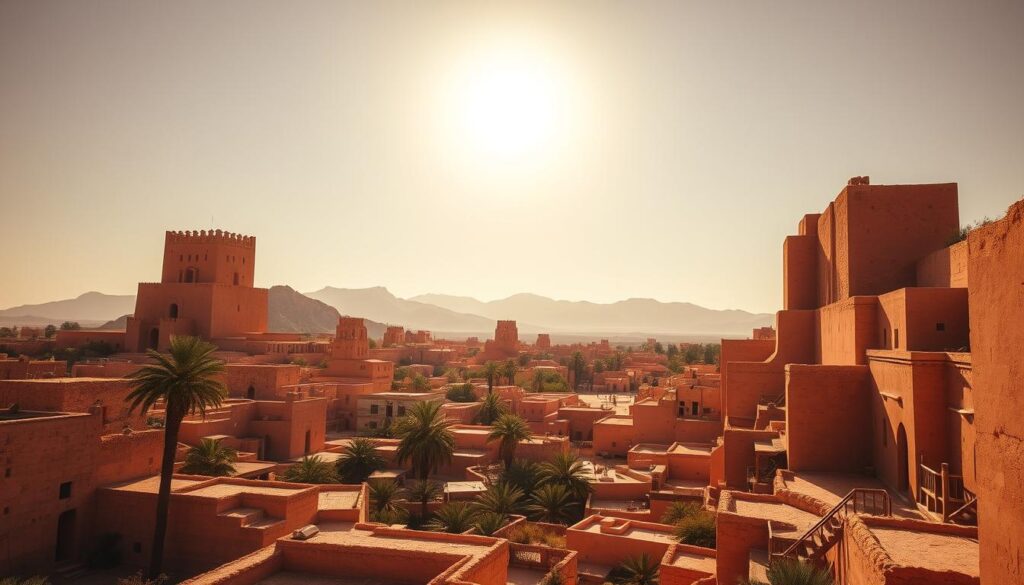
Historic Mud-Brick Architecture and UNESCO Heritage
Clamber up the terraced ruins where Berber families still reside, their cobalt-blue doors contrasting with earthy walls. The ksar’s ingenious design – using local clay and palm wood – has weathered a millennium of desert storms. “These walls hold stories older than the films,” murmurs a local guide, pointing to ancient caravan etchings.
Film buffs will recognise backdrops from Game of Thrones and Gladiator. The nearby Atlas Film Studios reveals props from 70+ productions. Time your visit for sunset – watch the ruins transform into a golden labyrinth worthy of any cinematic climax.
| Iconic Films Shot Here | Year | Scene Inspiration |
|---|---|---|
| Game of Thrones | 2011 | Yunkai’s slave city |
| Gladiator | 2000 | Roman training grounds |
| Kingdom of Heaven | 2005 | Crusader fortress |
Follow the old salt-trade route from Marrakesh to fully appreciate this heritage site’s strategic importance. As dawn breaks, you’ll understand why directors keep returning – the play of light on clay buildings creates magic no CGI could replicate.
Essential Guide: Best places to visit in Morocco
Crafting your Moroccan adventure requires equal parts research and spontaneity. The country’s compact size belies its staggering variety – you could be bargaining in Marrakech’s souks at dawn and watching sunset paint the Sahara dunes crimson by dusk.
Local Insights and Insider Tips
Seasoned travellers know Morocco reveals its secrets gradually. “Always leave room for serendipity,” advises Fes-based guide Amina. “That hidden courtyard café or spontaneous mint tea invitation often becomes your trip highlight.”
Pack lightweight scarves for mosque visits and comfy shoes for medina explorations. When haggling, start at 40% of the asking price – it’s expected. Friday mornings see quieter souks as locals attend prayers.
Balancing Urban Energy with Natural Wonders
Smart itineraries alternate cultural immersion with landscape therapy. After two days navigating Marrakech’s buzz, recharge in Ourika Valley’s waterfalls. Following Fes’ labyrinthine alleys, unwind in Middle Atlas cedar forests.
| Experience Type | Urban Highlights | Nature Contrasts |
|---|---|---|
| Cultural | Fes tanneries tour | Berber village homestay |
| Active | Casablanca architecture walk | Todra Gorge climbing |
| Relaxing | Rabat seaside promenade | Essaouira beach yoga |
Time coastal visits for May-September swell seasons. Desert excursions prove most comfortable October-April. However, shoulder seasons often deliver the magic balance of good weather and thinner crowds.
Relax at Taghazout Bay for Beachside Bliss
Imagine trading souk bustle for the rhythm of crashing waves along Morocco’s Atlantic coast. Taghazout Bay unfurls as a 5-kilometre crescent of golden sand, where surf culture meets authentic fishing village charm. This former hippie haven now welcomes everyone from pro wave-riders to yoga enthusiasts seeking salty-air serenity.
Surf, Sun and Rooftop Yoga Sessions
Dawn here begins with two choices: paddle out to world-class surf breaks or salute the sun on a breezy terrace. Local instructors offer lessons for all levels, while seasoned pros tackle Anchor Point’s legendary right-handers. Between sessions, refuel at beachfront grills serving just-caught sardines.
The yoga scene proves equally magnetic. Studios perch above azure waters, hosting sessions timed with tides. “Our flows sync with the ocean’s energy,” explains a resident instructor. Evenings bring acoustic guitar circles at bohemian cafés, their terraces strung with fairy lights.
Seasonal Surfing and Coastal Vibes
Winter swells (January-February) transform the bay into a surfing spectacle, drawing international competitors. Come September, warmer waters create mellower waves ideal for beginners. Year-round, the beach holiday vibe persists – think barefoot strolls past rainbow-hued houses with fishing nets drying in courtyards.
Accommodation ranges from surf-shack hostels to luxury resorts with spa pools overlooking the breakers. For the full experience, book a village homestay and learn to cook tagine from local grandmothers. However you stay, Taghazout’s magic lies in its effortless way of blending adventure with relaxation.
Adrenaline and Adventure in the Anti-Atlas Mountains
Crave landscapes where jagged peaks slice through cobalt skies? The Anti-Atlas range delivers raw, untamed beauty that’ll make your compass spin. This geological wonderland offers more than Instagram-worthy vistas – it’s where adventurers rewrite their personal limits.
Exciting Hiking Trails and Remote Escapes
Tackle the Atlas Mountains’ secret sibling through ancient Amazigh trading routes. You’ll scramble across lunar-like plateaus where nomadic herders still guide flocks to hidden springs. Local guides recommend the Tafraoute Circuit – a three-day trek past almond blossom valleys and granite rock arches.
Prefer solitude? The Anti-Atlas hides villages where mobile signals fade and starry skies dazzle. Spend nights in clay-built gîtes, swapping stories with Berber hosts over shared tagines. Morning brings new challenges – perhaps canyoning through Todgha’s lesser-known gorges or cycling past abandoned silver mines.
Geology buffs marvel at 550-million-year-old fossils embedded in cliff faces. Time your visit for spring when wildflowers carpet high-altitude plateaus. As one seasoned hiker grins: “This isn’t just a mountain range – it’s Earth’s history book made walkable.”

